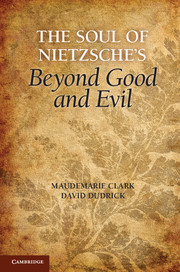6 - Nietzsche’s Soul
Published online by Cambridge University Press: 05 August 2012
Summary
We begin this chapter with an objection to our interpretation so far. We have argued that BGE One is organized so as to illuminate the “magnificent tension of the spirit” introduced in the preface, the two terms of which we have taken to be the will to truth and the will to value. But haven’t we overlooked an obvious alternative: namely, that this second will is actually the will to power? Isn’t this alternative more plausible, in fact, given our claim that BGE One is designed to provide the information we need to understand the magnificent tension of the spirit, in view of the prominent place of the will to power in Part One and the fact that it never mentions a will to value?
In section 6.1, we argue that one need not choose between the will to value and the will to power. According to our analysis, BGE 6 and 9 offer a dual-level analysis of what goes on when a person philosophizes, such that the will to value is operating at the level of the self or person, whereas a will to power is at the level of the drives. But how is the self related to her drives? There is good reason to think that Nietzsche considers persons or selves to be bodies. Zarathustra tells us that while the child takes himself to be body and soul, the “awakened and knowing say ‘body am I entirely, and nothing else, and soul is only a word for something about the body’” (Z I: “Despisers of the Body”). The point, presumably, is that selves or persons are bodily organisms but that there is something about these organisms that makes them persons. In 6.2, we analyze BGE 6 to show that Nietzsche takes this “something” to be the fact that the organism’s drives are arranged in a “rank order.” Contrary to what is assumed by other interpretations, however, this order is not a naturalistic or causal order, an order of strength, but is a normative order. Because this normative order of the drives constitutes one’s values, what makes one a person is precisely the capacity for values.
- Type
- Chapter
- Information
- The Soul of Nietzsche's Beyond Good and Evil , pp. 141 - 175Publisher: Cambridge University PressPrint publication year: 2012



